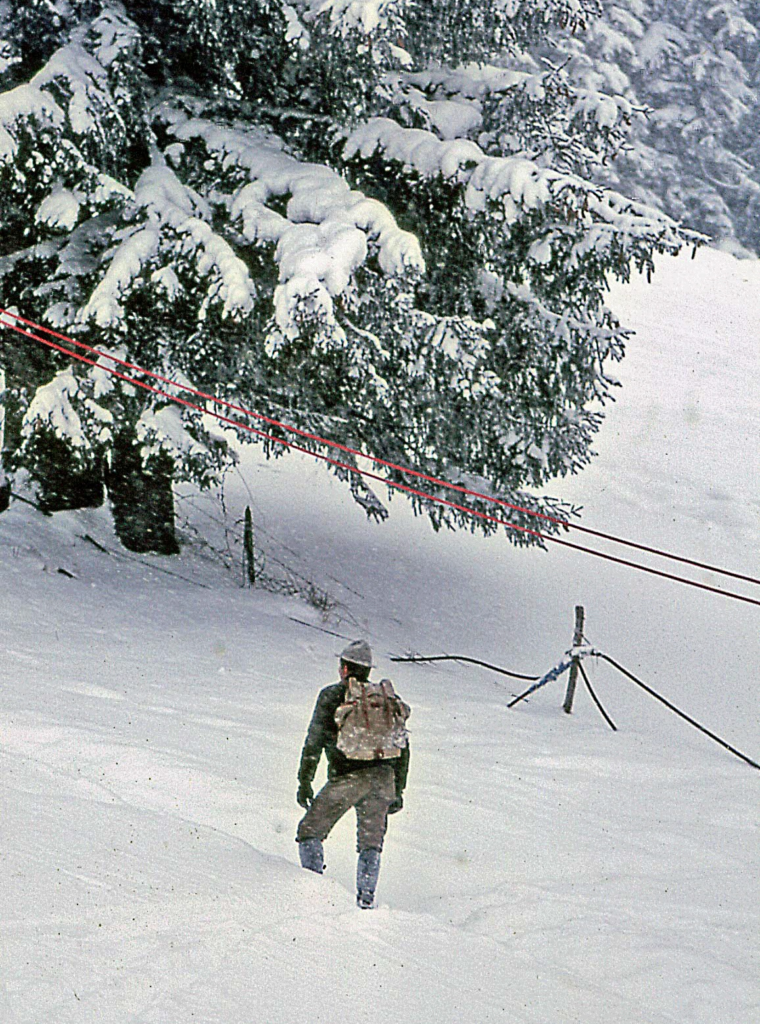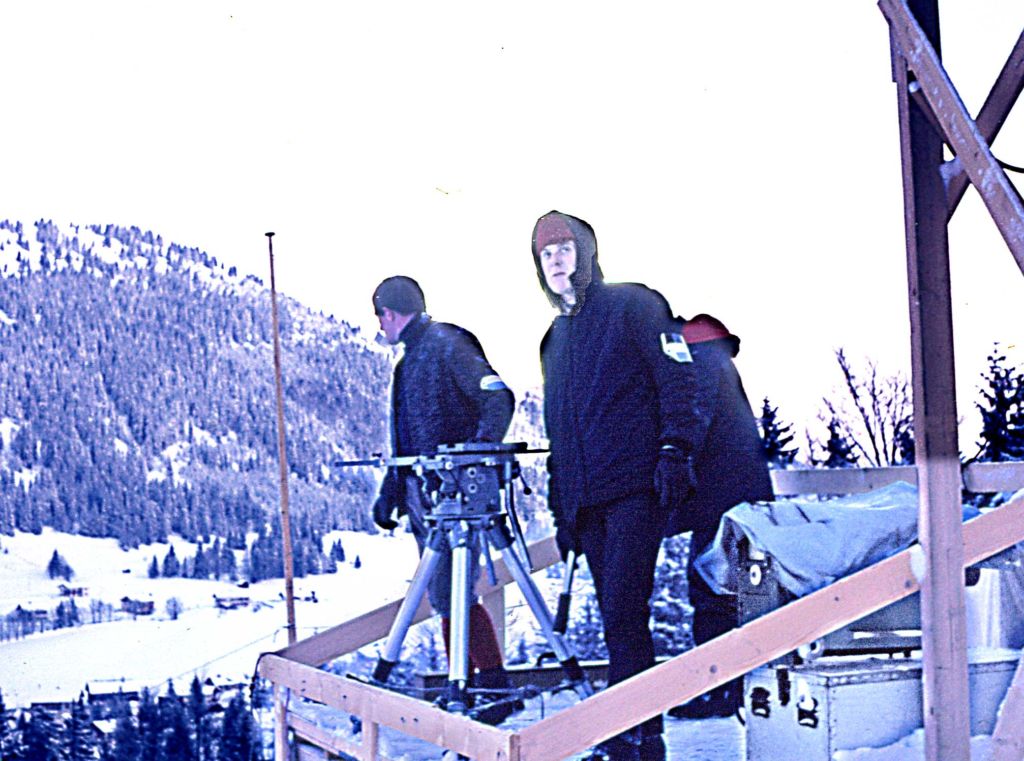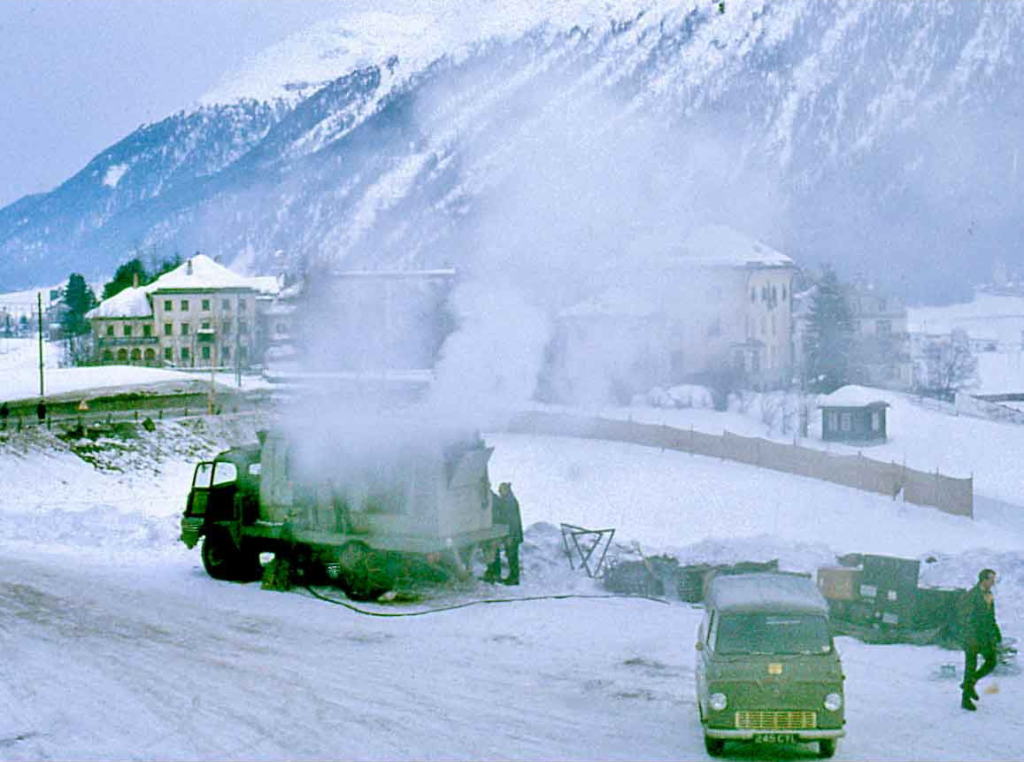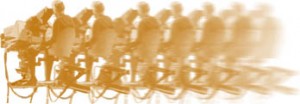
In 1964 the whole OB unit returned from Innsbuck where InterTel had covered the Winter Olympics for ABC Wide World of Sport. The crew found in its absence the construction of a studio. My first task on arrival at InterTel was to help complete the sound proofing of the studio by sticking thousands of egg boxes to the walls, then learn how to make cable ends for vision and sound, as nearly all staff were hands-on with repairs, maintenance as well as innovation. Cameramen and riggers alike stapled dark green pleated silk on the walls of the green room and laid the carpet: it was early days and costs were kept low. Camera Cables were 50 feet and 100 feet, and Audio cables were sometimes up to 200 feet long, all rolled onto drums, one good rigger could just manage a 1 drum at arm’s length in each hand. Luckily the company across the yard was The Kings Cross Truck Co, where they made all sorts of trolleys and barrows. We kept them quite busy making all our cable drums and even copied specialised equipment, for – as said – saving money was the order of the day. With any new equipment, it was a bit like Henry Ford – you could choose your colour as long as it was Hammer Finish Grey. They even sprayed my Mini truck the same – as I must have parked it in their spot by mistake!
The next job and my first OB was “Come Dancing” at Whitley Bay and then on to Rugby or Wigan to cover a Rugby match for the BBC. We were paid twice a month, month end for salary – £16.00 a month in my case – and then the middle of the month for overtime which sometimes more than doubled the salary. I had dropped salary from £20 at Lyons to £16 but it was to be the best move of my life. Johnny Fielder ran “Air Time Productions” and following Trevor was one or maybe the first to do clean “L” edits on 2” Video Tape Quad system developed by Ampex. Manually cutting with a razor blade an “L” to account for the four and a half inch difference between Sound and Vision on the tape. John made many of the early video commercials and his second in command was Lynn Currie (who later formed ‘Angelo Productions” with Mike Kent to make the legendary “Sun” Newspaper Ads at TVR). The tiny Ealing studio – probably only some 9 meters by 5 meters – packed in some amazing firsts: Bernard Braden made a pilot for his series, Cleo Lane recorded a special as did David Frost with his Paradine Productions, Peter Sellers and Mike Bentine many other celebrities graced the Marley tiled studio floor. The lighting was the most basic, manually hung, clamped and plugged from a scaffolding grid, any few extra lights would be hired and maintained by Johnny Lee and his brother who were just down the road also in Ealing. At that time, they had some Mole equipment but were much later to import the lighter and cheaper Italian Lights which were installed for Wycombe Road Stonebridge Park. The Lee boys many years later ended up taking over the building for Lee Films after LWT vacated the building. Another first of that incredibly innovative time was the building of a control panel which could – at the flick of a switch or turn of a dial – control any light in the studio, and could be pre-set (really a state of the art invention at the time): this was pioneered by Brian Rottger (known as “Castro”) initially at Ealing. Of course, as with any prototype, it did occasionally – or more often than not – send up a few smoke signals as a transistor / thyristor or two (make it six) would blow on a dimming instruction. Later the console was enlarged and installed in Stonebridge Park (Brian became a millionaire when some years later he sold his company to bigger fish and went traveling the world, even to this (early) day of writing he and his wife have a house in Kenya and central London.)
On the 3nd June 1963 Steve Beamish and I took the 3-truck with the Ampex 1000X in the back to London Airport, opposite the Ariel Hotel, as usual we parked within the airport perimeter in an empty car park next to a telephone pole with what was termed a twisted pair and a coax at the base. Down that line came a Eurovision feed, once linked up to our truck we could await and view the announcement of the death of Pope John XX111. It was a cold rainy day and Steve’s miserable attitude did not brighten it one bit. I was left to check the monitor and listen to the news as it came in, also to ponder why Pope John XX111 was sometimes called ‘The Good Pope’? What on earth did he do the rest of the time? Planes landed continuously every minute, darkness arrived, and we were able to see landing lights lined up as far back as Tower Bridge I’m sure…
Suddenly the smoke hit the fan …
I heard it as I was stretching my legs outside …… rushed to the back of the truck and leapt up the big step in one bound to start the machine, but in mid-air I was stopped in my tracks and brought to my knees at the same time. ‘Someone’ (who shall be nameless) had left a top cupboard door open and it gashed my head from top centre to ear. Adrenaline is amazing: I stood up, gave the old valve rack a drop kick and pressed “Play” and “Record” all together and we had it, then staggered out of the truck with blood streaming all over – and Beamish screamed: “Hell you look a mess. Go get cleaned up”. There was nowhere to go, and it was pitch dark – after a while the profuse bleeding stopped and I felt a lot thinner, my head felt cold in the night air, I shook and shivered for a short while but got over it. Then drove the truck back to base and went home to frighten the living daylights out of my wife who was by then sleeping, she awoke to scan my draculean blood dried face and clothes. Next morning the doctor examined me as the gash ached just a bit. He said twenty-three or so stitches would do the trick, but – maybe we should just leave well alone, it’s bled a great deal, matted and looks clean enough… I was to learn from that cleavage to leave wounds alone if they have bled well – nature’s cleaning mechanism and subsequent scab plaster is more efficient than our attempt at sack stitch or band aid.
Chris Patten recalls recording a European Royal Wedding of note from the same pole, when every 45 minutes a dispatch rider would arrive, whereupon they would physically cut the tape mid-stream hand it to him to catch a BOAC or an American flight to New York, where on arrival a similar truck would be waiting to transmit across the networks. Primitive by today’s standards but back then up-to-the-minute cutting-edge stuff!!
On the 24th January 1965 Trevor Wallace, the trucks and we, the crew, were on our way aboard a ferry to Rotterdam then on to St Moritz to cover the Winter Olympics for ABC Wide World of Sport. About an hour or so out in the Channel, the news hit that Winston Churchill had died. All hell let loose while Trevor vociferously tried to convince the captain to turn the Channel ferry around as InterTel were, and had been, contracted for some years to cover Mr. Churchill’s funeral in Whitehall. The captain could not oblige in spite of threats that he could immediately join Mr. Churchill and forever live in hell. Trevor eventually had to contract a French OB unit to reverse cross the channel and fill the Whitehall gap in our absence, and so we journeyed on to St Moritz.

St. Moritz Cresta Run – February 1967
John Ridge, as previously noted, was an ex-Lyons driver, and also an ex ‘Para’, and had dropped on Suez when all the trouble hit some years before. We stayed at a three-star hotel in town (that was before inflation set in and things moved to five star). It was normal to leave your dirty work boots outside your door overnight and regardless of how dirty they were they would be shiny new by morn. I came home very late one night and there were John’s boots caked in mud sitting silently, snow bleached, outside his door. So I removed one and took it into my room. Up early the next morn on leaving I placed the original boot next to the bright new model. Even downstairs at breakfast we could hear the commotion as John had a go at management for only cleaning one boot. Don’t mess with ex Para’s.

In Celarina village at the end of the bob sled run, we four riggers were sipping hot chocolate in a hotel across the road when there was a sudden clacking noise and an ominous puff of smoke as a con rod pushed its way through the side of the Generators engine block Whoops!! John had failed to check the generator’s oil level. After a great deal of persuasion, the local garage managed to plate and weld up the hole in the block and we tried to nurse the engine on three cylinders while we waited for a relief unit that Trevor managed to hire from some far-off distant town. Regardless of cost and effort it had to be done, as ABC Wide World of Sport was relying on our coverage.
Chris Evans
Ealing, London, was often a hive of activity, something was always being invented, some good, some not so good. Chris Evans, who resembled a mad professor and was a dynamo (in today’s world he would have been on a Ritalin drip from birth) was constantly building or originating something – we had a mid-night break-in at the studio, he quickly built a burglar alarm system and installed it the same day. Wow! The burglars were so impressed with the alarm system, the next night …. They stole the alarm and left all the other gear.
In the workshop was a board for the “Folly” of the month, for any failures or part thereof. Steve’s attempt at making a coax connector stood its ground for quite some time. Cables and connectors were a constant requirement in any down-time and I would like a pound for every one I have made. Steve on the other hand stuck to what he did best: overall Facilities Manager and superb Racks operating, turning out brilliant pictures.
Jobs would come in at a moment’s notice at all different places, anywhere at any time. CBC’s Pierre Berton shows from the Westbury Hotel were a welcome and consistent bread winner. They created great interest as he would interview people in the news from notorious criminals to Prime Ministers (Bad choice – aren’t they the same thing?). Local News coverage was important … Douglas Hume resigned … Off to the Conservative Offices … Harold Wilson to be interviewed in Winston Churchill’s office at Chequers… Did that man ever answer a question whilst in office? … better than I, he could sidestep anything, not me though, for I tripped over the elephant’s foot at the side of Mr. Churchill’s desk.
Just down the road at Great Missenden, another time from Chequers. We set up for a Lee Bailey Show interview at Patricia Neal’s house. Such a tower of strength. What a story! Patricia proved to women of the world there is life after the pronouncement of Cancer and any other disaster that life can throw at you.
One has to say even in those early days of InterTel some of us were privileged to visit and learn so much from so many incredible people from all walks of life. In the wonderland of the Alps, I shared schnapps with a German U-boat commander who was decorated with the Iron Cross by Hitler for getting his sub up the Thames … I’d asked if he’d ever been to England? Errr!
Even when I wasn’t part of the crew to go to Greece for an NBC Today Show (and I was not a happy chappy ), it fell to me to cover with the 2-truck another Pierre Berton Show at the Westbury with a totally freelance crew and then set up and cover the first and the only time, I believe, the BBC covered a wrestling match complete with rehearsals. England was on a high throughout this period, America was more than interested in our music, our comedy, our entertainment shows, our scripts in fact just about everything British …Leslie Phillips, Spike Milligan, Michael Bentine, Cleo Lane, David Frost: just a few of the stars of the mid-sixties who plied their trade at the Ealing InterTel studio.
 |  |  |



